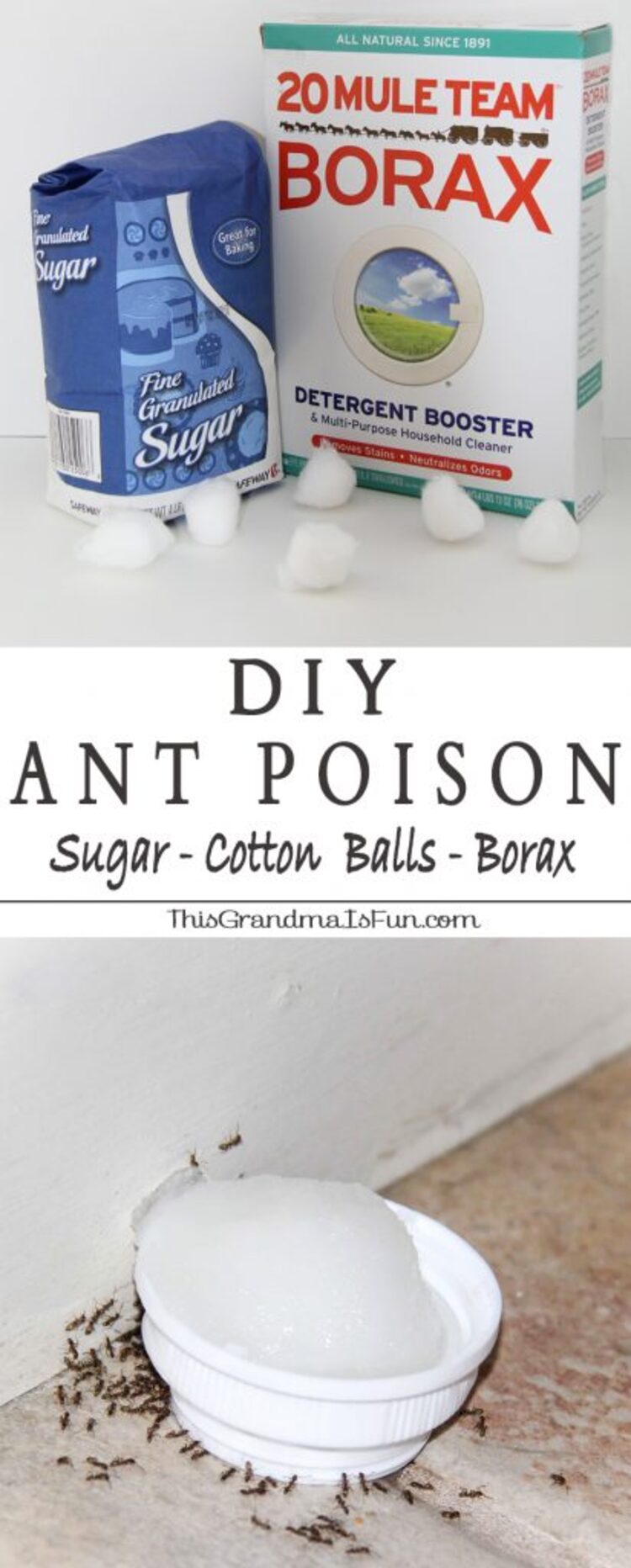Key Takeaways
Pet-safe ant killers use natural ingredients like diatomaceous earth, vinegar, and essential oils.
Diatomaceous earth dehydrates ants without harming pets.
Vinegar and water spray disrupts ant trails and repels them effectively.
Homemade solutions like peppermint oil and lemon juice are safe and easy to make.
Consistent application and preventive measures ensure long-term ant control.
Effective Pet-Safe Ant Control Strategies
Dealing with ants in your yard while ensuring the safety of your pets can be a challenging task. However, there are numerous natural remedies that can help you get rid of ants without posing any risk to your furry friends. Let’s explore some of the most effective pet-safe ant control strategies.
“Poison Ants DIY” from www.thisgrandmaisfun.com and used with no modifications.
Common Ant Behavior and Yard Infestations
Understanding the behavior of ants is crucial in effectively controlling their population. Ants are social insects that live in colonies, and they communicate through pheromones. These chemical trails help them find food and navigate back to their nests. Most importantly, ants are attracted to food sources, moisture, and shelter, which makes your yard an ideal place for them to thrive.
Infestations typically start with scout ants searching for food. Once they find a source, they leave a pheromone trail for other ants to follow. Therefore, interrupting these trails and eliminating food sources are key steps in controlling ant infestations.
Pet-Safe Versus Chemical Ant Killers
Traditional chemical ant killers can be effective, but they often contain harmful ingredients that pose risks to pets. Chemicals like boric acid, fipronil, and hydramethylnon are toxic to animals and can cause serious health issues if ingested. Besides that, these chemicals can linger in the environment, leading to long-term exposure.
On the other hand, pet-safe ant killers use natural ingredients that are effective against ants but harmless to pets. These natural solutions are not only safer but also eco-friendly. Let’s dive into some of these natural ingredients and how they work.
Natural Ingredients That Kill Ants Safely
Several natural ingredients can effectively kill ants without posing any risk to your pets. These ingredients are easy to find and can be used to create homemade ant killers and repellents. Here are some of the most effective ones:
Diatomaceous Earth: Nature’s Pest Control
Diatomaceous earth (DE) is a naturally occurring, soft, siliceous sedimentary rock that is easily crumbled into a fine white powder. This powder is made up of the fossilized remains of diatoms, a type of hard-shelled algae. DE is an excellent pet-safe ant killer because it works by dehydrating ants. When ants come into contact with DE, it absorbs the oils and fats from their exoskeleton, causing them to dry out and die.
“Diatomaceous earth is deadly if touched by ants, but it just feels like a soft, fine powder to humans and pets.”
To use DE, simply sprinkle it around ant trails, entry points, and any areas where you notice ant activity. Make sure to reapply after rain or heavy dew, as moisture can reduce its effectiveness.
Vinegar and Water Spray
Vinegar is another effective and pet-safe ant killer. It works by disrupting the pheromone trails that ants use to communicate and navigate. When ants lose their way, they are less likely to return to your yard. Additionally, if you’re looking for more pet-friendly garden ideas, consider planting sweet alyssum which is safe for dogs and cats.
Here’s how to make a vinegar and water spray:
Mix equal parts of white vinegar and water in a spray bottle.
Spray the solution directly on ants and along their trails.
Focus on entry points and areas where you see the most ant activity.
Reapply as needed, especially after rain.
This solution not only kills ants on contact but also repels them from returning to the treated areas. For more tips on safe gardening, check out our guide on pet-safe plants.
Baking Soda and Powdered Sugar
Baking soda and powdered sugar make an effective combination for killing ants. The sugar attracts the ants, while the baking soda reacts with the acid in their digestive system, causing them to die. For more tips on maintaining a pet-safe garden, check out our article on pet-friendly sweet alyssum.
To create this mixture:
Mix equal parts of baking soda and powdered sugar.
Sprinkle the mixture around ant trails and entry points.
Monitor the areas and reapply as needed.
This method is safe for pets and can help reduce the ant population in your yard.
Boiling Water With Dish Soap
Boiling water with dish soap is a simple yet effective method to kill ants. The hot water scalds the ants, while the dish soap helps to break down their exoskeletons, leading to their demise.
To use this method:
Boil a pot of water.
Add a few drops of dish soap to the boiling water.
Carefully pour the solution over ant mounds and trails.
Be cautious when handling boiling water to avoid burns. This method is best used directly on ant nests to ensure maximum effectiveness. For more information on pet-safe plants, check out pet-safe Angelonia.
Homemade Ant Repellents Safe for Pets
In addition to killing ants, it’s essential to use repellents that prevent them from entering your yard. Here are some homemade ant repellents that are safe for pets:
Peppermint Oil Spray
Peppermint oil is a natural ant repellent that works by overwhelming the ants’ sense of smell. Ants rely on their sense of smell to navigate and find food, so the strong scent of peppermint oil can deter them from entering your yard.
To make a peppermint oil spray, you can also consider using pet-friendly plants to enhance your yard’s safety for pets.
Mix 10-15 drops of peppermint essential oil with a cup of water in a spray bottle.
Shake well to combine.
Spray the solution around entry points, trails, and any areas where you see ant activity.
Reapply as needed to maintain its effectiveness.
Lemon Juice and Water Solution
Lemon juice is another natural ant repellent that works by disrupting the ants’ pheromone trails. The acidity of the lemon juice also makes the environment less hospitable for ants.
To create a lemon juice and water solution, you can also consider using pet-friendly plants around your yard to enhance the effectiveness and safety for your pets.
Mix equal parts of lemon juice and water in a spray bottle.
Spray the solution along ant trails, entry points, and other areas where you notice ant activity.
Reapply regularly, especially after rain.
Cinnamon Barrier
Cinnamon is a natural ant repellent that can be used to create barriers around your yard. The strong scent of cinnamon disrupts the ants’ ability to communicate and navigate. For more pet-friendly gardening ideas, check out our guide on Sweet Alyssum.
To use cinnamon as a barrier:
Sprinkle ground cinnamon around entry points, trails, and any areas where you see ant activity.
Use cinnamon sticks to create barriers around plants and other vulnerable areas.
Reapply as needed to maintain its effectiveness.
Applying Homemade Solutions Effectively
Applying these homemade solutions correctly is crucial to ensure their effectiveness. Here are some tips on how to use these solutions effectively:
For example, if you are using cinnamon sticks to protect plants, you can also consider using pet-friendly plants that are safe for your pets.
Spraying Entry Points and Trails
When using sprays like vinegar and water or peppermint oil, focus on entry points and trails where ants are most active. These are the areas where ants are likely to enter your yard and find food sources.
By targeting these areas, you can disrupt their trails and prevent them from returning. Make sure to reapply the sprays regularly, especially after rain, to maintain their effectiveness.
Using Barriers to Prevent Entry
Creating barriers with substances like diatomaceous earth, cinnamon, and baking soda can help prevent ants from entering your yard. Sprinkle these substances around entry points, trails, and any areas where you see ant activity.
By creating physical barriers, you can deter ants from crossing into your yard and finding food sources. Reapply these barriers as needed to ensure they remain effective.
Maintaining a Pest-Free Yard: Pet-Safe Practices
Besides using homemade ant killers and repellents, maintaining a pest-free yard requires consistent effort and preventive measures. Here are some pet-safe practices to keep your yard free from ants:
Regular Yard Maintenance
Keeping your yard clean and well-maintained is essential in preventing ant infestations. Regularly mow your lawn, trim bushes, and remove any debris that could provide shelter for ants.
Ensure that your yard is free from standing water, as ants are attracted to moisture. Fix any leaks and ensure proper drainage to prevent water from accumulating in your yard.
Eliminating Food and Water Sources
Ants are attracted to food and water sources, so it’s essential to eliminate these attractants from your yard. Clean up any food spills, store pet food in sealed containers, and remove any fallen fruit or vegetables from your garden. For more tips, you can check out this natural pet-safe ways to get rid of ants.
Ensure that your trash cans are tightly sealed and regularly emptied to prevent ants from finding food sources in your yard.
Creating Natural Barriers
Besides using homemade solutions, creating natural barriers can help prevent ants from entering your yard. Planting ant-repellent plants like mint, lavender, and rosemary can help deter ants from your yard.
These plants not only repel ants but also add beauty and fragrance to your yard. Consider planting them around the perimeter of your yard and near entry points to maximize their effectiveness.
Final Thoughts on Pet-Safe Ant Control
Dealing with ants in your yard can be challenging, but with the right strategies, you can effectively control their population while keeping your pets safe. Natural remedies like diatomaceous earth, vinegar, essential oils, and other homemade solutions are not only effective but also eco-friendly.
By understanding ant behavior, using natural ingredients, and maintaining a clean yard, you can create an environment that is inhospitable to ants. Consistent application and preventive measures will ensure long-term success in keeping your yard ant-free. For more tips, check out this natural pet-safe way to get rid of ants.
Frequently Asked Questions (FAQ)
What natural ingredients are safe for pets and effective against ants?
Several natural ingredients are both safe for pets and effective against ants, including diatomaceous earth, vinegar, peppermint oil, lemon juice, baking soda, and cinnamon. These ingredients can be used to create homemade ant killers and repellents that are non-toxic and eco-friendly.
How often should I apply natural ant killers and repellents?
The frequency of application depends on the method used and the level of ant activity. For sprays like vinegar and water or peppermint oil, reapply every few days or after rain. For barriers like diatomaceous earth or cinnamon, reapply as needed to maintain their effectiveness, especially after rain or heavy dew.
Is diatomaceous earth completely safe for pets?
Diatomaceous earth is generally safe for pets when used correctly. It is a fine powder that feels soft to humans and animals but is deadly to ants. However, it’s important to use food-grade diatomaceous earth and avoid inhaling the dust. Apply it in areas where pets are less likely to disturb it to ensure their safety.






